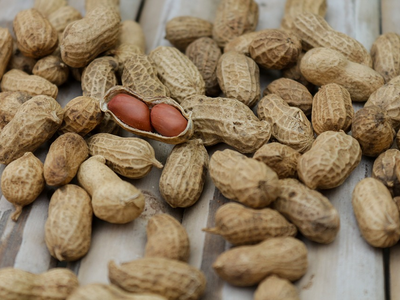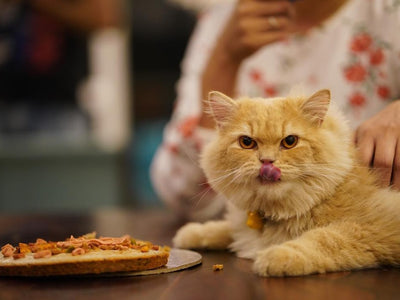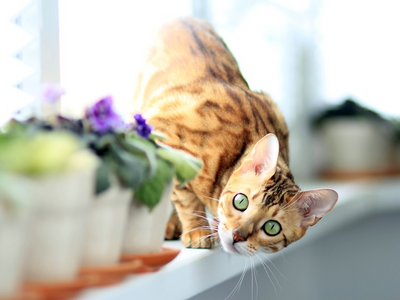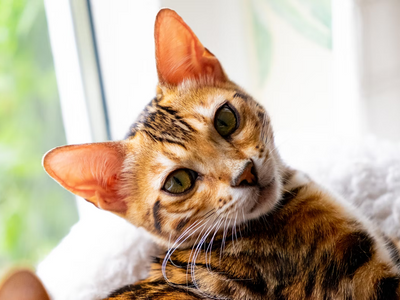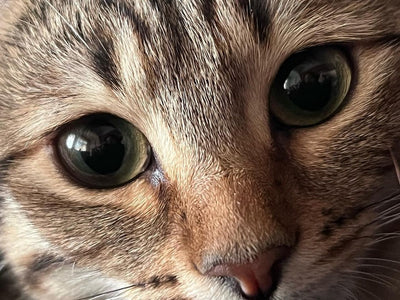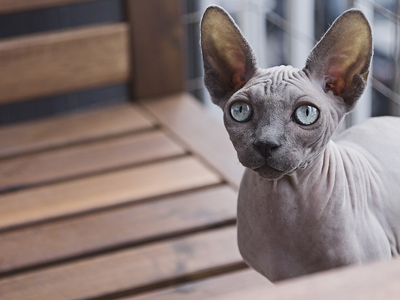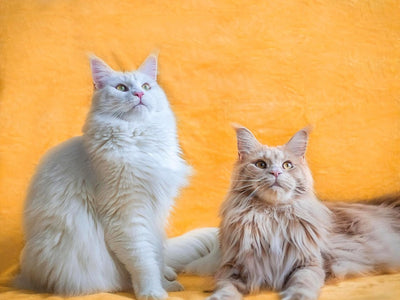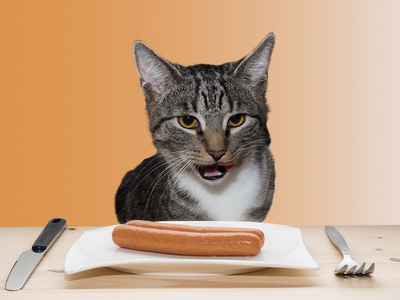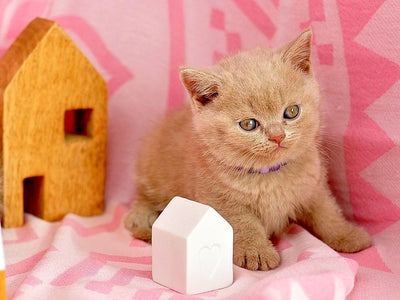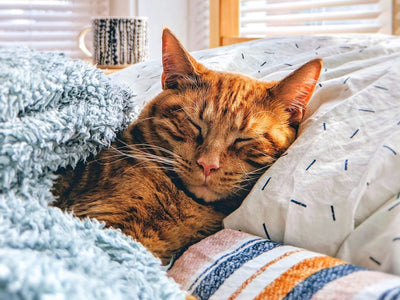30.09.2022
Everything you need to know about kitten development
Newborn kittens depend on their mother for food, comfort, and warmth in the first few weeks of their life. If you have rescued an orphan kitten, you should get relevant information about their sleeping and feeding requirements to help them get through this sensitive time. Although it might seem like a daunting task, taking care of a kitten is not that difficult once you get the hang of it. Untamed presents crucial facts on:
- Developmental changes in kittens during the first eight weeks of their life
- Your cat’s eating, sleeping, and pooing needs
- Catching early signs of sickness and allergies
- Tailor-made cat food according to your kitten’s unique requirements
Raising a tiny feline? Here’s what you need to know about kitten growth week-by-week
Taking care of a kitten is a full-time job. One of the first steps is determining their age so that you can provide appropriate care and nutrition. You can usually assess a cat’s age by their weight. Check out the table below for an age-appropriate weight chart to figure out how old your furry pet is:
|
Kitten age |
Weight (in grams) |
|
Newborn |
50 to 150 grams |
|
Week 1 |
150 to 250 grams |
|
Week 2 |
250 to 350 grams |
|
Week 3 |
350 to 450 grams |
|
Week 4 |
450 to 550 grams |
|
Week 5 |
550 to 650 grams |
|
Week 6 |
650 to 750 grams |
|
Week 7 |
750 to 850 grams |
|
Week 8 |
850 to 1,000 grams |
This chart is a generic guide. A kitty’s weight also depends on their breed, gender, lifestyle, and physical health status. Every kitten is different, so if you feel that your kitten is over- or underweight, make sure to check other developmental and behavioural milestones to get an accurate result.
The first week of a kitten’s life
A newborn kitten has closed eyes and folded ears. Since they cannot see, they interact with the world through their subtle sense of smell. A kitten this small has bright pink gums and paws, is unable to stand, and relies solely on their mother for nutrition, warmth, and digestion. Feline babies can only process their mother’s milk or a kitten milk replacement formula.
A week-old kitten will spend 20 to 22 hours a day sleeping, which helps in:
- Developing their organs
- Strengthening the bones
- Building the muscles
The following table presents the details of a newborn’s development during their first week:
|
Kitten’s age |
Developmental changes |
|
One day old |
|
|
Three days old |
|
|
Six days old |
|
|
One week old |
|
If mother’s milk is unavailable, you should feed your tiny feline kitten milk replacement (KMR). KMRs are commercial products designed to mimic the taste and composition of cat milk. Newborn kittens do not have a gag reflex, so feed them slowly to prevent choking and vomiting.
During the first week, your feline should ideally be kept at 35 to 36 degrees temperature to stay warm. You will also need to stimulate the kitten so that they can defecate. To do this, rub a baby wipe in gentle, circular motions on the kitten’s tummy until they start to poo.
A two-week-old kitten—what to expect

“I’m watching you, hooman.”
Source: Lucas Pezeta
A two-week-old kitten keeps close to their mother or caregiver for warmth and comfort.
Here are some developmental and behavioural milestones they should hit during this period:
- Their eyes will take a few days to completely open, but they will have poor vision. All kittens initially have blue eyes. The colour changes to their unique shade when a kitten is about two months old
- The ear canals are completely open, and their ears are small and round
- Kittens start to explore their surroundings, testing their legs and paws with uncoordinated and unstable movements
- They should double their birth weight
- Kittens are likely to interact more with other kittens and their caregiver by the end of the second week
- The senses continue to develop, and kittens will hiss if they smell or hear something unfamiliar
Understanding the developmental changes of a 3-week-old kitten
During their third week, you can figure out whether you have a girl or a boy. A female kitten’s genitalia looks like a straight line, while a male cat’s genitals appear circular. A three-week-old kitten will also start their teething process, growing the front teeth, called the incisors. Their ears should point upwards, like in adult cats. Previously non-retractable claws will slowly start retracting.
While your furry friend will still spend most of the day snoozing, they will wake up more often to practice their motor skills. There will be a significant improvement in their walking and standing abilities.
At three weeks, your kitten will drink more milk during feeding. They will also be able to poo without any stimulation, so it is the best time to start litter training them.
What is a 4-week-old kitten up to?
At four weeks, a kitten is no longer considered neonatal. They should be confidently walking, aware of their surroundings, and ready to play. Developmental changes happening at this stage are as follows:
- Kittens now have fully extended ears and can sit properly
- The canines start to develop
- They will transition from their mother’s milk or kitten milk replacement to solid food
When kittens are four weeks old, it is an excellent time to slowly introduce wet food.
After your kitten’s first month
When your new furball is about a month old, they will have enough energy to play with you during the day. Their senses are developed, and they can run, chase toys, and interact with their siblings and cat parents. When kittens get tired, they fall asleep on the spot, no matter where they are.
Milestones that a 5-week-old kitten should achieve

Exploring the outside world—let me go out, hooman!
Source: Kirsten Bühne
Kittens love socialising and exploring, so interact with your kitten as much as possible to help them develop social skills.
Some milestones that your kitty should hit by the end of week five are:
- Claws should be completely retractable
- Premolars are supposed to emerge
- They should become more independent
At five weeks, a kitten’s digestive tract will probably be developed enough, so they can switch entirely to wet kitten food since the mother will probably stop feeding them at this stage. When you introduce kitten food, make sure to provide enough water to prevent dehydration, indigestion, and constipation.
Your furry pet at 6 weeks
With molars appearing, your kitten will slowly come to the end of the teething process. Their hearing and vision will be completely developed, making them more curious about their surroundings.
At this age, kittens should be stable enough to jump and land on their feet. Around their 6th week, your feline companion should receive their FVRCP vaccine, which will protect them from rhinotracheitis, calicivirus, and panleukopenia.
The 7th week of a kitten’s life
A kitten eats approximately four to five times a day, depending on their size. At seven weeks, a kitten is completely weaned, and you can add semi-moist or dry kitten food as treats and snacks. Avoid feeding your kitten only dry food as there is no moisture in it, which might result in dehydration, UTIs, or kidney problems. Biscuits also have more calories than wet food, and overconsumption can create unhealthy eating habits, leading to obesity and related issues.
Your kitten will start changing their eye colour at approximately seven weeks of age, getting their adult shade. They will also experience an energy surge with a slight decrease in sleeping time. You can expect kittens to climb furniture, such as beds and sofas. Start training them to behave well and introduce scratching posts and interactive toys.
What to expect from an 8-week-old kitten

OMG, I could play ball forever!
Source: Hanna
At eight weeks, a kitten weighs approximately 850 to 1000 grams and should eat wet food regularly.
Two-month-old kittens should be dewormed and checked by a vet periodically for internal parasites. If more than 14 days have passed from the first FVRCP vaccine, consider getting a booster shot.
Once your kitten turns four months, you should consider sterilising them to prevent:
- Unwanted and unplanned pregnancies
- Spontaneous catfights
- Undesirable and aggressive hormonal behaviour
Adequate nutrition can help your furball achieve their developmental milestones
Feline nutrition is vital for proper growth and development. If fed inadequately, kittens can suffer from diarrhoea, vomiting, and food poisoning. This can lead to dehydration and severe weight loss in kittens, which is super risky for their growth.
The right food for your kitty
Once your kitten has started eating solids, give them food free from grains, sugar, fruits, veggies and other carb-rich ingredients. Cats are obligate carnivores and do not need carbohydrates in their diet. The feline digestive system is not designed to process or absorb nutrients from anything other than meat and fish.
Cat food should also be free from artificial colourants and flavour enhancers, which can lead to digestive problems and allergic reactions.
Felines require food rich in animal protein, with less than 20% animal fat. Animal proteins contain essential amino acids, including arginine and taurine, fundamental for healthy development. Vegetable and plant proteins only provide empty calories and can deter growth and development in felines.
What should kittens avoid?
Various products from the human supply chain are toxic to felines. You should be extra careful about your kitten’s diet to prevent poisoning, allergic reactions, and malnourishment. Check out the table below for more details:
|
Difficult to digest ingredients |
Toxic food |
Untamed supports your kitten’s progress with healthy and tasty meals

Untamed cat food is versatile, healthy, and delicious.
Source (c) Untamed
Kittens require high-protein meals for proper growth and development. Untamed can help them hit all the milestones effortlessly because we offer the ideal protein-to-fat ratio in scrumptious dishes made with lean meat and fish.
Our food is steamed to preserve the nutritional value and natural aroma of the ingredients while the process eliminates all pathogens and keeps your sensitive feline safe from gastrointestinal problems.
Untamed’s vet-formulated recipes are free from common allergens and artificial additives and colourants. We source the ingredients from sustainable and ethical suppliers and use fully recyclable packing for our products.
Our cat food is rich in animal protein, the primary energy source for felines. Animal proteins in our products have a biological value of 90%, so your kitten will get the energy boost they need without the risk of gastrointestinal issues, including diarrhoea, indigestion, and irritable bowel syndrome.
Depending on your cat’s preference, you can get yummy jellies and gravies made of:
Our cat food contains all the necessary vitamins and minerals, including magnesium, copper, vitamin A, D, E, and B12, vital for your kitten’s physical and mental growth.
Order Untamed today and join thousands of satisfied cat parents raising happy and healthy felines!
How to order Untamed’s taster pack
Getting a steady supply of Untamed for your kitten is simple. Here is what you should do to get your feline started on a tasty, well-balanced diet:
- Visit the Try Now page
- Answer a few questions about your kitten
- Pick the products and place your order
Once your kitten goes through the taster pack and picks their favourite, subscribe to monthly deliveries, which you can change, postpone, or cancel whenever you like.
Here is how the Untamed diet affects cats:
|
Timeline |
Health benefits |
|
Within a week |
|
|
After two months |
|
|
After four months |
|
|
Life-long benefits |
|
From kittenhood to adulthood—Untamed is there for you!
Untamed’s cat food is not only meant for kittens—our high-quality, well-balanced food works for felines at any life stage. Our meals help:
- Kittens through early growth and development
- Adult cats stay active and energetic
- Seniors maintain a healthy weight
Our cat food also works for recuperating cats, pregnant queens, old and frail felines, and neutered males struggling with weight gain.
Other practical tips regarding kitten care
Food and nutrition is not the only aspect of feline care. Here are some other tips that you can use to help a kitten achieve their developmental milestones:
- Kitten-proof your home—Keep electric cords, house plants, insect traps, and toxic medication out of your kitten’s reach. Shut all doors and windows to prevent kittens from hiding in spots where you won’t be able to find them
- Interact with them as much as possible—Kittens love companionship. You should play with them as much as possible to prevent loneliness and anxiety
- Avoid milk at all costs—Felines are often lactose-intolerant and can suffer from gastrointestinal issues from dairy products, such as cow milk or cheese

![Associated image for What human food can Sphynx cats eat? [Comprehensive list]](http://untamed.com/cdn/shop/articles/what_human_food_can_sphynx_cats_eat_Featured_400x300_crop_center.jpg?v=1648705074)
